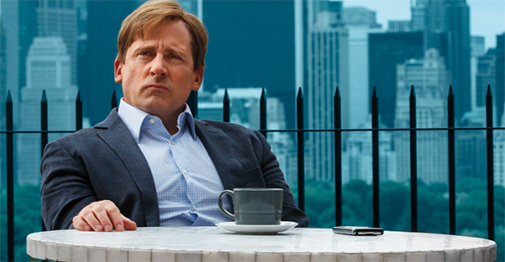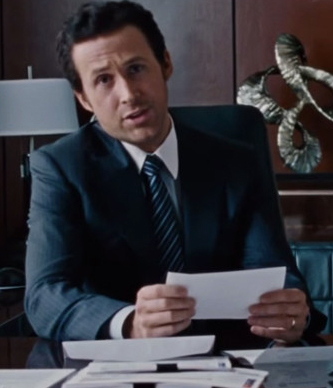
For this edition of Contrarian Corner, we'll have to redub it "Conflicted Corner". Lynn Lee discusses her mixed feelings about the Oscar's primary dark horse.
In this year’s Best Picture race, The Big Short is the one title that virtually no one saw coming very far in advance. Which is appropriate for a movie about an event that only a handful of people predicted. And while it’s fallen back a little in the shadow of The Revenant’s nomination-leading surge and Globe wins, it’s still very much in play for Oscar’s big prizes. With five nominations (fpicture, director, supporting actor, adapted screenplay, and editing) under its belt, as well as a strong performance both at the box office and the Critics Choice Movie Awards, who knows?
 The Big Short's ascendance hasn’t gotten it much love here at TFE, where the prevailing reaction has been a mixture of incredulity and disdain. I get it, especially if you’re mourning the omission of better films from Oscar’s best picture lineup. And yet, dare I say I’m neither surprised nor dismayed at its inclusion, and on the whole am pleased at its success? Yet also oddly conflicted.
The Big Short's ascendance hasn’t gotten it much love here at TFE, where the prevailing reaction has been a mixture of incredulity and disdain. I get it, especially if you’re mourning the omission of better films from Oscar’s best picture lineup. And yet, dare I say I’m neither surprised nor dismayed at its inclusion, and on the whole am pleased at its success? Yet also oddly conflicted.
Frankly, I enjoy The Big Short, while recognizing its limitations...
It’s not cinematic in the usual sense; there’s nothing remarkable about it aesthetically. It relies on narrative gimmicks and shortcuts that can get tiresome after a while, and that essentially assume – albeit with a wink and a nudge – that the viewer has the knowledge and attention span of a gnat. The acting, including Christian Bale’s Oscar-nominated performance, is perfectly fine but hardly awards-worthy. Plus – and here I think is the root of TFE’s general reaction to towards the movie – it has the superficial aura of a “bro” movie, in that it focuses entirely on a bunch of white male investors who are trying to make millions by exploiting a Wall Street blind spot. The trailers for the movie enhance this impression, presenting their efforts as a quasi-caper movie, as if shorting the housing market were somehow analogous to raiding a casino.
The impression, however, is misleading as the movie is, if anything, anti-“bro.” Its message is not “look how awesome we are,” but “can you believe this??” Based on a nonfiction book about how these guys—yes mostly guys, as the financial world is—shorted the U.S. housing market, because everyone else was either oblivious or deliberately looking the other way, The Big Short deals with a complicated underlying subject that can be impenetrable to those who don’t work in finance. But it’s a subject that matters far beyond the financial world, and director Adam McKay, who also co-wrote the screenplay, clearly wanted as many people as possible to understand why it matters. He also made the shrewd calculation that the most effective way to do that was not just to inform, via a documentary or even a serious straight drama, but to entertain—by making an absurd (tragi)comedy that would read as satire if it hadn’t actually happened.
And you know what? It works.

We may roll our eyes at the use of Margot Robbie in a bubble bath, Anthony Bourdain preparing bouillabaisse, or Selena Gomez high-rolling at blackjack as vehicles for “subprime mortgages and CDOs for dummies” tutorials. But I’ll remember their explanations longer than those of, say, Inside Job, a movie I saw and didn’t retain at all. Fourth-wall breaking aside, The Big Short is briskly paced and sharply funny in its takedown of the sheer wtf-ness of the housing bubble. At the same time, against all odds it gets us to root for the upstart guys who are betting on this Jenga tower to collapse, even while showing the cataclysmic implications of such a failure. And it concludes with the most devastatingly ironic bait-and-switch possible, no less infuriating for knowing it’s coming: the collapse happens and the guys get their money, but the house still wins. The rotten-to-its-core system is rescued and resurrected in all its odiously corrupt glory, while ordinary people suffer the fallout.
It helps, of course, if you share McKay’s anger at Wall Street for getting away with this shit and his sense of urgency in not letting them do it again. The point, though, is that he smartly channels that anger into accessible entertainment while still getting across the core message to a much broader audience than that served by books and documentaries on the same subject. The movie makes the viewer laugh even as it hits a nerve—the same nerve, I suspect, that’s animating so much of the crazy political discourse in the U.S. right now. It’s not film as art, but rather film as cleverly packaged agitprop. In other words, it’s pretty much the exact opposite of a film like Carol. Nothing wrong with that. They were made, and can be appreciated, for different reasons. The Big Short is a timely movie; Carol is timeless.

But does The Big Short deserve its Oscar nominations? Outside of adapted screenplay, probably not.
In my view, to be considered for best of the year a film has to show more cinematic craft or artistry, or to embrace its medium as something more than a vehicle for a political message. I’m not sure The Big Short does that, although I also think naysayers underrate the difficulty of what it accomplishes. I don’t want it to win but its current level of recognition isn't a bad thing, especially if it gets more people to see the movie and think about the issues it raises.

How about you? Which nomination are you most conflicted though not unhappy about?